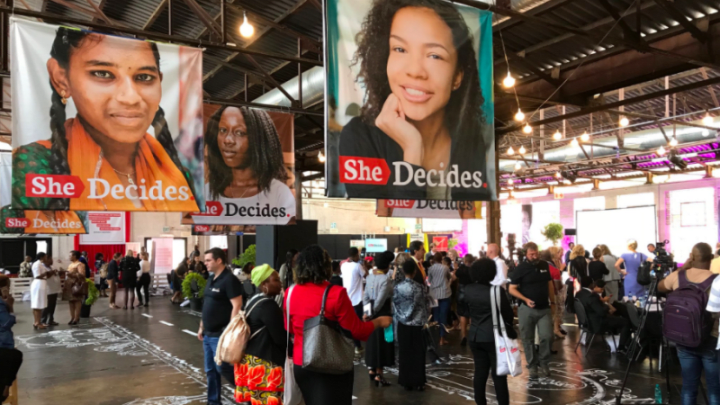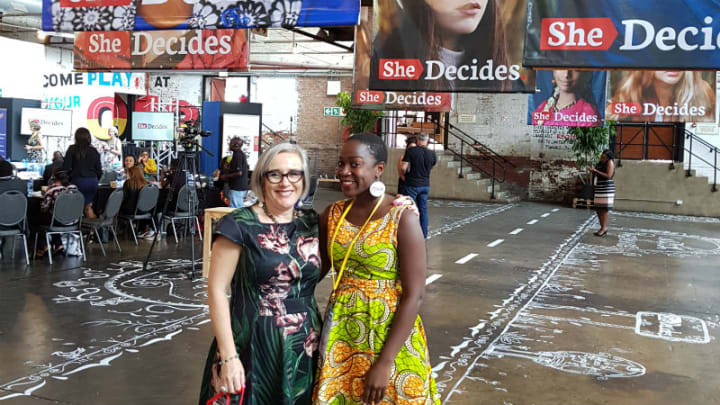
LONDON — On the one year anniversary of the launch of the She Decides movement, key family planning organizations remain defiant in the face of U.S. reinstatement of its “global gag rule,” but they also warn there is still a long way to go especially as some major donors, notably the United Kingdom, have yet to step up to replace lost funds.
She Decides was launched by former Dutch Minister for Development Lilianne Ploumen. To date, the movement has raised $450 million in new funding to support women’s sexual health and reproductive rights NGOs impacted by the gag rule. It boasts 40,000 individual supporters and is backed by more than 50 governments.
However, senior executives at International Planned Parenthood Federation and Marie Stopes International say there is still a long way to go. The two organizations were hit hardest by the gag rule, losing approximately $100 million and $80 million in U.S. funding, respectively, because they have refused to sign. Some also expressed fears that the movement’s focus on abortion could be “diluted” in an effort to attract more funding.
“We’re very excited that one year on, the shape of the movement is profoundly different from where it was when we started,” Robin Gorna, co-lead of She Decides, told Devex at a one-year anniversary event being held in South Africa with youth leaders, politicians, and U.N. representatives. “This is not your usual suspects or people who generally go to meetings with SRHR [sexual and reproductive health and rights] in their titles, and this is something we feel incredibly proud of,” she said.
The gag rule, also known as the Mexico City Policy was introduced by President Donald Trump soon after his inauguration in January 2017 and bars foreign NGOs that receive any U.S. global health funding from performing or promoting “abortion as a method of family planning.” That includes offering legal advice or counseling related to abortion. Groups that sign the gag rule are not even allowed to fund abortion-related services with funding from other donors.
“The movement isn’t and never was only about abortion. It was always about women and girls getting to decide about their bodies.”
— Robin Gorna, co-lead of She DecidesGorna told Devex that the “movement isn’t and never was only about abortion ... it was always about women and girls getting to decide about their bodies and of course there’s a risk that things get watered down but all movements change.” She added, “the real risk is that the services which are essential to women and girls are not going to be funded anymore.”
Meanwhile, key donors including the United Kingdom have yet to donate to She Decides. The U.K.’s reluctance has surprised many sector experts, considering the U.K. came out strongly against the gag rule when it was last introduced by President George W. Bush in 2001, pledging 3 million pounds to fund abortion services. While the U.K. has been a strong supporter of family planning and hosted a high-profile FP2020 summit in June, which raised at least $2.5 billion for reproductive health services, no funding has yet been pledged to She Decides.
These issues were raised when sexual and reproductive health advocates and politicians gathered in Parliament on Wednesday to mark the movement’s anniversary at an event chaired by Labour MP Gareth Thomas, who was under-secretary of state for international development in 2001 and spearheaded the government’s response to the U.S. gag rule.
When asked by Devex why the current U.K. government has so far declined to fund She Decides, Thomas said he suspected “the desire to not offend the United States” was behind the decision. He called on the campaigners to write to their MPs in order to “put pressure” on the new secretary of state for development, Penny Mordaunt, to take up the cause.
A diluted message on abortion?
With donors dragging their feet on funding, some are concerned a central aim of the movement — access to safe abortion — will become watered down.
Marjorie Newman-Williams, vice president and director of external affairs at MSI, was at the session and said the movement’s strong stance on abortion was in danger of being “diluted” in an effort to make it broader and more appealing to donors.
“You can feel much less ease with the issue of abortion, a reluctance to pick it up. We need to realize that remains a battle to be continued.”
— Alvaro Bermejo, director general of IPPF Global“We’ve already seen the impact of the She Decides movement in galvanizing more political will and funding,” she said before adding: “But we would like to make an appeal that in the effort to make She Decides a broad movement that we don’t leave abortion behind [and] we don’t dilute it to make it more acceptable, because this is why it started and this is the thing that is most threatened.”
Alvaro Bermejo, the new director general of IPPF Global, who made his first public appearance in the new role at the event, agreed. He said “getting abortion on the agenda” proved to be more difficult at the June family planning summit in London compared to when the conference was first held in 2012. Talking about last year’s event, he said “abortion could only come in at the margins of the summit in some obscure committee room,” adding that “you can feel much less ease with the issue of abortion, a reluctance to pick it up … we need to realize that remains a battle to be continued.”
However, Bermejo, who moved to IPPF from the Children’s Investment Fund Foundation where he was executive director of the survive and thrive portfolio, also said She Decides should be about more than abortion.
“I would really encourage this Parliament and the U.K. government to support those organizations being left behind by the global gag rule and to support She Decides to respond to that but also as something that can create a wave that can take us forward, not just on abortion but on contraception, on violence, on gender equity,” he said.

Tikhala Itaye, a She Decides champion and former president of the African Youth and Adolescent Network, also said the movement should avoid becoming a one-issue movement.
“What we don’t want She Decides to do is just isolate one issue; it’s bigger than just abortion,” she said. “The minute we start isolating and overusing on one issue, then we’re not been being cognizant of all the other things going on … we need to see the whole picture of what women and girls go through.”
A far-reaching gag
MSI estimated 2.5 million unintended pregnancies, 870,000 unsafe abortions, and 6,900 avoidable maternal deaths would occur as a result of cuts from the global gag rule. The organization also reported it closed, or was set to shut down, some of it operations in Madagascar, Uganda, and Zimbabwe, as Devex reported in January.
IPPF is projected to lose $100 million in funding over the next three years, thanks to the global gag rule, and many services and clinics have already been closed as a result, Bermejo said.
While Bermejo thanked the governments and foundations that “stepped up” and funded She Decides when it was launched the day after Trump reinstated the order, he also acknowledged that some of the damage would be irreversible.
“What you break is a trust and relationship with the client that will never trust the service again [and] that will be very hard to win back to getting another implant in or another IUD when they close the clinic that was providing it,” he said. “It’s very difficult to recover from that.”
The new IPPF director was full of praise for the way the She Decides movement, which now has a manifesto and a London-based support unit, has evolved since it was so rapidly launched last year, describing it as “amazingly well framed.”
“It is framed in terms of women and girls deciding … about when to have sex, who to have sex with, when to have families, what to do with their body, their life, and their future,” he said.


